Overnight oats vs other breakfasts is a question many people ask when trying to lose weight. With so many choices available — from cereal and smoothies to toast and cooked oats — it’s not always easy to know what the best breakfast for slimming really is. That’s why comparing overnight oats with other breakfasts matters. Unlike cereal, which is often high in sugar, or smoothies that can be loaded with hidden calories, overnight oats offer a balance of fiber, protein, and slow-digesting carbs that keep you fuller for longer. This makes them an excellent option for weight loss.
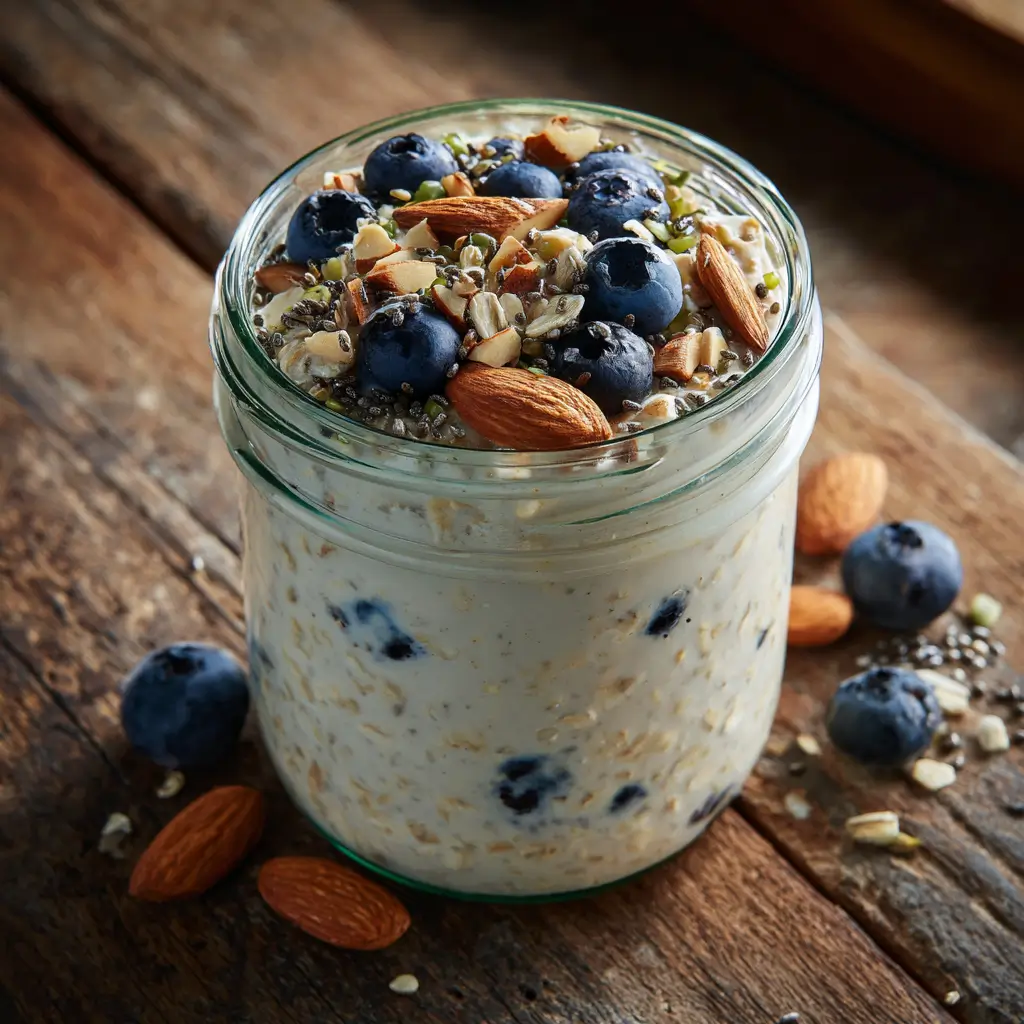
In this article, we’ll explore overnight oats vs other breakfasts in detail, looking at how they stack up in calories, satiety, and overall nutrition. We’ll compare oats to cereal, smoothies, and toast to see which breakfast supports weight loss the best. We’ll also answer common questions like are overnight oats a good breakfast for weight loss and which is better, overnight oats or cooked oats? If you’re serious about slimming down, check out our guide on the Overnight Oats Base Formula & Variations to start building the perfect breakfast that fuels your goals.
Table of Contents
Introduction to Breakfast and Weight Loss
Why breakfast choices matter for slimming
When it comes to weight control, the debate around overnight oats vs other breakfasts is more than just a trend — it’s backed by nutrition science.
Breakfast sets the tone for your day, and the meal you choose can either support or sabotage your slimming goals. Sugary cereals may give a quick burst of energy, but they’re low in fiber and leave you hungry fast. Toast, especially when made with refined bread, breaks down quickly and causes energy crashes. Smoothies can be nutrient-dense, but many are high in calories and don’t keep you full for long. By contrast, overnight oats digest slowly, provide steady energy, and can be tailored with toppings like fruit, nuts, or protein powder to keep hunger at bay. That’s why more people comparing overnight oats vs other breakfasts end up choosing oats as the smarter option.
Discover more ideas in our Protein Overnight Oats Recipe that proves oats can be filling and slimming at the same time.
Print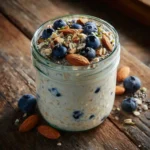
Overnight Oats vs Other Breakfasts: The Best Choice for Weight Loss
- Total Time: 8 hours
- Yield: 1 serving 1x
Description
A healthy and satisfying breakfast to prep the night before – packed with fiber, protein, and natural sweetness.
Ingredients
- ½ cup rolled oats
- 1 cup unsweetened almond milk (or milk of choice)
- 2 tbsp Greek yogurt
- 1 tsp chia seeds
- ½ banana, sliced
- ¼ cup berries (blueberries, strawberries, or raspberries)
- 1 tsp nut butter (optional)
Instructions
- Add rolled oats, almond milk, and Greek yogurt to a jar.
- Stir in chia seeds for added fiber.
- Add banana slices and berries.
- Cover and refrigerate overnight (6–8 hours).
- In the morning, stir well, top with nut butter if desired, and enjoy.
Notes
Great for busy mornings. You can customize with your favorite fruits, seeds, or nut butter.
- Prep Time: 5 minutes
- Cook Time: 6–8 hours
- Category: Breakfast
- Method: No-Cook
- Cuisine: Healthy
Nutrition
- Serving Size: 1 serving
- Calories: 310
- Fat: 8g
- Carbohydrates: 50g
- Fiber: 9g
- Protein: 13g
How calories and satiety play a role in morning meals
The best breakfast for slimming comes down to two main factors: calories and satiety. Satiety is how long a meal keeps you satisfied, and calories are the energy it delivers. In the overnight oats vs other breakfasts comparison, oats win on both counts. They’re naturally rich in fiber, which slows digestion and prevents overeating later in the day. Cereal, on the other hand, often packs more sugar than nutrients, making it a poor choice for weight loss. Smoothies can easily go overboard on calories if they include too much fruit juice or nut butter.
Toast is simple, but without enough protein or fiber, it won’t keep you full. Overnight oats strike a balance: low sugar, customizable toppings, and the ability to stay within a healthy calorie range.
Don’t miss our breakdown on Overnight Oats Calories: 7 Easy Tips to see how you can enjoy oats while keeping portions perfect for weight loss.
What Are Overnight Oats?
How overnight oats are made
When comparing overnight oats vs other breakfasts, it’s important to know how overnight oats are prepared. Instead of cooking, rolled oats are soaked in milk, almond milk, or yogurt overnight in the fridge. By morning, they’re soft, creamy, and ready to enjoy cold or warmed. This no-cook method makes them more convenient than toast and often healthier than cereal. Cereal may be fast, but it usually hides sugar. Toast may be simple, but it doesn’t deliver lasting energy. Overnight oats, on the other hand, offer both convenience and balanced nutrition in one jar.
Nutritional profile of overnight oats
One of the reasons overnight oats stand out in the overnight oats vs other breakfasts debate is their nutrition. Oats are naturally high in fiber, which helps you feel fuller for longer and supports digestion. They also provide steady energy, unlike cereal that spikes blood sugar or smoothies that can be calorie-dense. Toast, while common, lacks both protein and fiber unless topped heavily. Overnight oats can be enhanced with nuts, seeds, or Greek yogurt, making them one of the best breakfasts for slimming. This combination of fiber, protein, and slow-digesting carbs makes them a smart weight-loss choice.
Overnight Oats vs Cereal for Weight Loss
Comparing sugar content: oats vs cereal weight loss
One of the most common comparisons in the debate of overnight oats vs other breakfasts is oats versus cereal. While cereal is marketed as quick and healthy, most boxed versions are loaded with added sugars and refined carbs. These cause blood sugar spikes and energy crashes that make weight loss harder. Overnight oats, on the other hand, are naturally low in sugar (when prepared wisely) and rich in fiber, which slows digestion and keeps you full. This makes the difference in oats vs cereal weight loss very clear — oats provide steady energy, while cereal often leaves you hungry again within hours.
Fiber and fullness: why oats may beat cereal
Satiety plays a big role in slimming, and this is where overnight oats stand out. Cereal generally lacks the fiber and protein needed to keep you satisfied. Even whole-grain cereals don’t provide the same level of fullness as oats. Overnight oats are high in beta-glucan, a type of soluble fiber that supports heart health while reducing hunger. When combined with healthy toppings like nuts, seeds, or yogurt, they create a complete breakfast that supports long-term weight control.
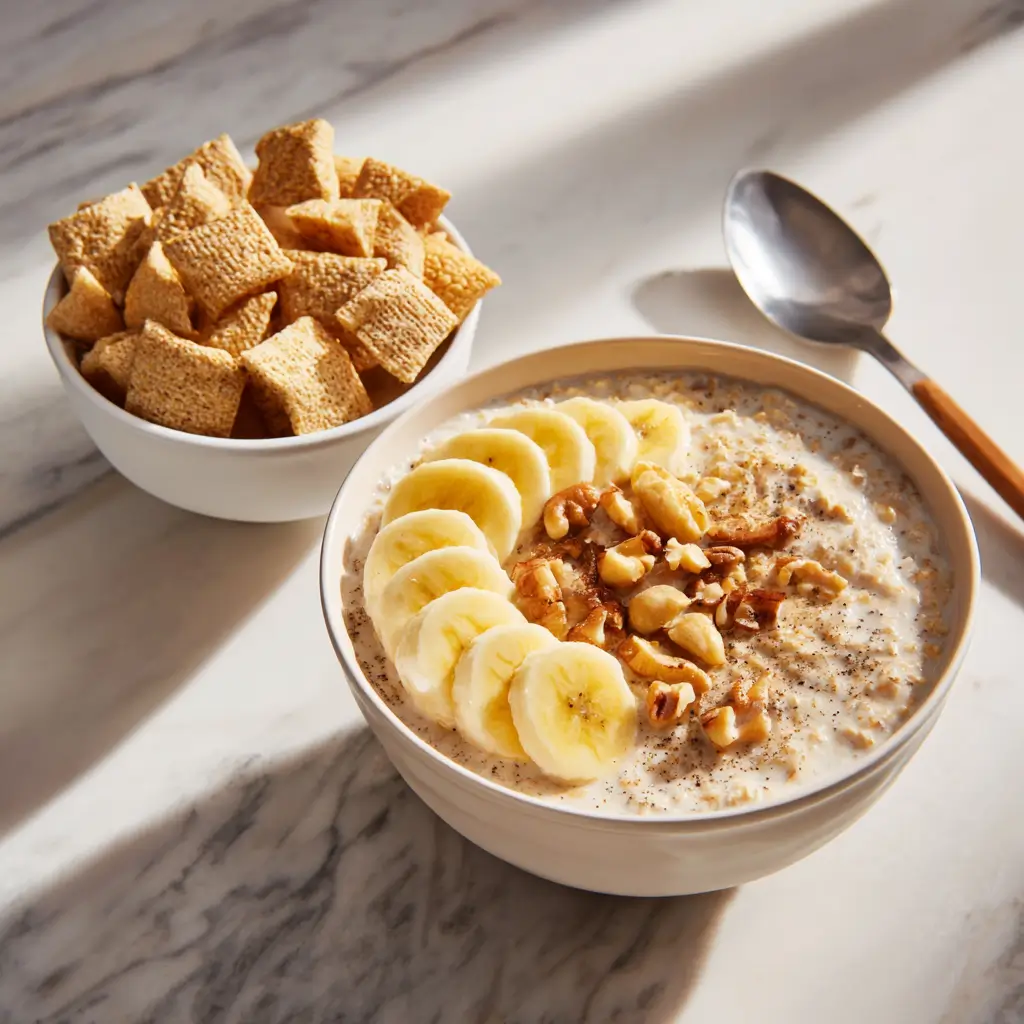
For step-by-step ideas that make oats both tasty and slimming, explore our guide to Overnight Oats Calories: 7 Easy Tips, which helps you keep portions under control for weight loss success.
Overnight Oats vs Smoothies
Calorie check: oatmeal vs smoothie calories
When comparing overnight oats vs other breakfasts, smoothies are often seen as a healthy choice. They’re colorful, full of fruits and veggies, and quick to blend. But in the debate of oatmeal vs smoothie calories, smoothies can easily overshoot your calorie goals. Add fruit juice, nut butters, or sweetened yogurt, and suddenly your “light” breakfast has more calories than a full meal. Overnight oats, by contrast, are portion-controlled and more predictable. With unsweetened milk and simple toppings, oats deliver steady energy at a lower calorie cost. That’s why in the discussion of overnight oats vs other breakfasts, oats are usually the more weight-loss-friendly choice.
Digestion and satiety differences
Another key factor in overnight oats vs other breakfasts is digestion. Smoothies digest quickly because blending breaks down the fiber, leaving you hungry again within hours. Overnight oats keep their fiber intact, slowing digestion and supporting longer satiety. Adding protein-rich toppings like Greek yogurt or chia seeds makes oats even more filling, turning them into one of the best breakfasts for slimming. While smoothies can be refreshing, overnight oats are better suited for weight loss because they keep you full and reduce the urge to snack.
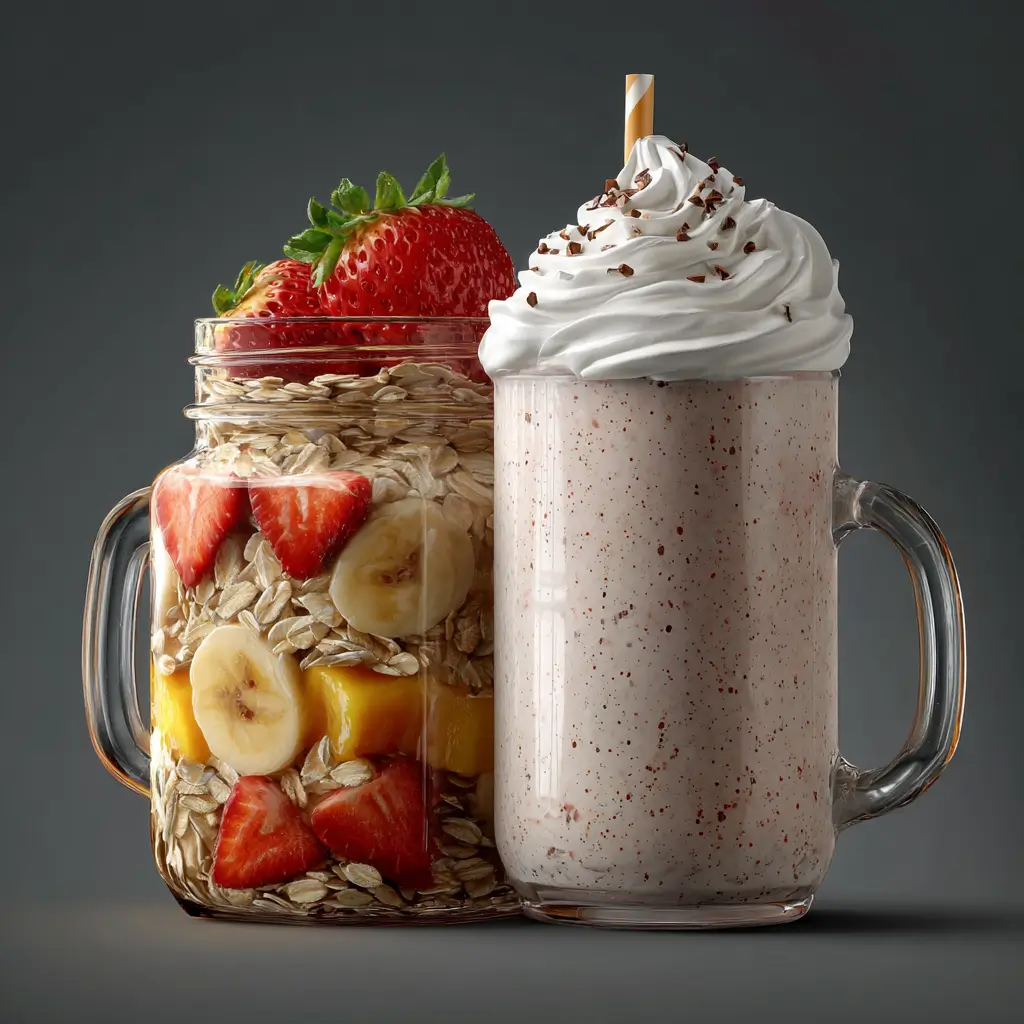
Overnight Oats vs Toast and Other Common Breakfasts
Carbs and energy release: oats vs bread
One of the most common debates in overnight oats vs other breakfasts is whether oats or toast provide a better start to the day. Toast, especially white bread, digests quickly and often causes blood sugar spikes, leading to mid-morning hunger. Even whole-grain bread, while better, doesn’t compare to the slow-release carbs in oats. Overnight oats, packed with fiber, provide steady energy and help control appetite. In the comparison of oats vs bread, oats clearly stand out as the smarter choice for those focused on slimming and lasting fullness.
Protein balance and topping options
Protein is another area where overnight oats shine in the overnight oats vs other breakfasts discussion. Toast usually requires toppings like eggs or nut butter to add protein, which can make it calorie-heavy. Oats, however, can be soaked with milk, yogurt, or protein powder and topped with seeds or nuts to create a nutrient-dense, balanced meal. This makes them one of the best breakfasts for slimming, combining satiety with nutritional variety. For a tasty, protein-rich option, try our Protein Overnight Oats Recipe, which is designed to keep you full and energized for hours.
Cooked Oats vs Overnight Oats
Nutritional differences between cooking and soaking
When discussing overnight oats vs other breakfasts, it’s also worth comparing overnight oats to cooked oats. While both start with the same ingredient, the preparation changes their texture and nutritional impact slightly. Cooked oats are made by heating oats in water or milk, which can reduce resistant starch levels, a type of fiber that supports gut health and fullness. Overnight oats, on the other hand, preserve more resistant starch since they’re soaked instead of cooked. This can make them even better for appetite control and digestion. Both versions are healthy, but the soaking process gives overnight oats an edge for weight management.
Which is better for weight loss?
In the weight-loss discussion of overnight oats vs other breakfasts, comparing cooked oats with overnight oats often comes down to satiety and convenience. Cooked oats are warm and comforting, but they take more time to prepare, which can lead some people to skip breakfast or grab less healthy options. Overnight oats, on the other hand, are ready to go in the morning and easier to portion control. Since they hold onto more resistant starch, they may also help with feeling full longer compared to cooked oats. This makes overnight oats a smart choice for those focused on slimming.
The Best Breakfast for Slimming
How to build a fat-burning breakfast
When considering overnight oats vs other breakfasts, the key is to build a meal that supports fat loss while keeping you satisfied. The best slimming breakfasts combine protein, fiber, and healthy fats. This trio balances blood sugar, prevents cravings, and boosts metabolism. A bowl of cereal may be convenient, but it often lacks protein and fiber. Toast can provide carbs, but without the right toppings, it doesn’t deliver lasting fullness. Smoothies can be nutrient-packed but often tip the scale on calories. Overnight oats, however, naturally fit the fat-burning formula when combined with Greek yogurt, chia seeds, or nut butter.
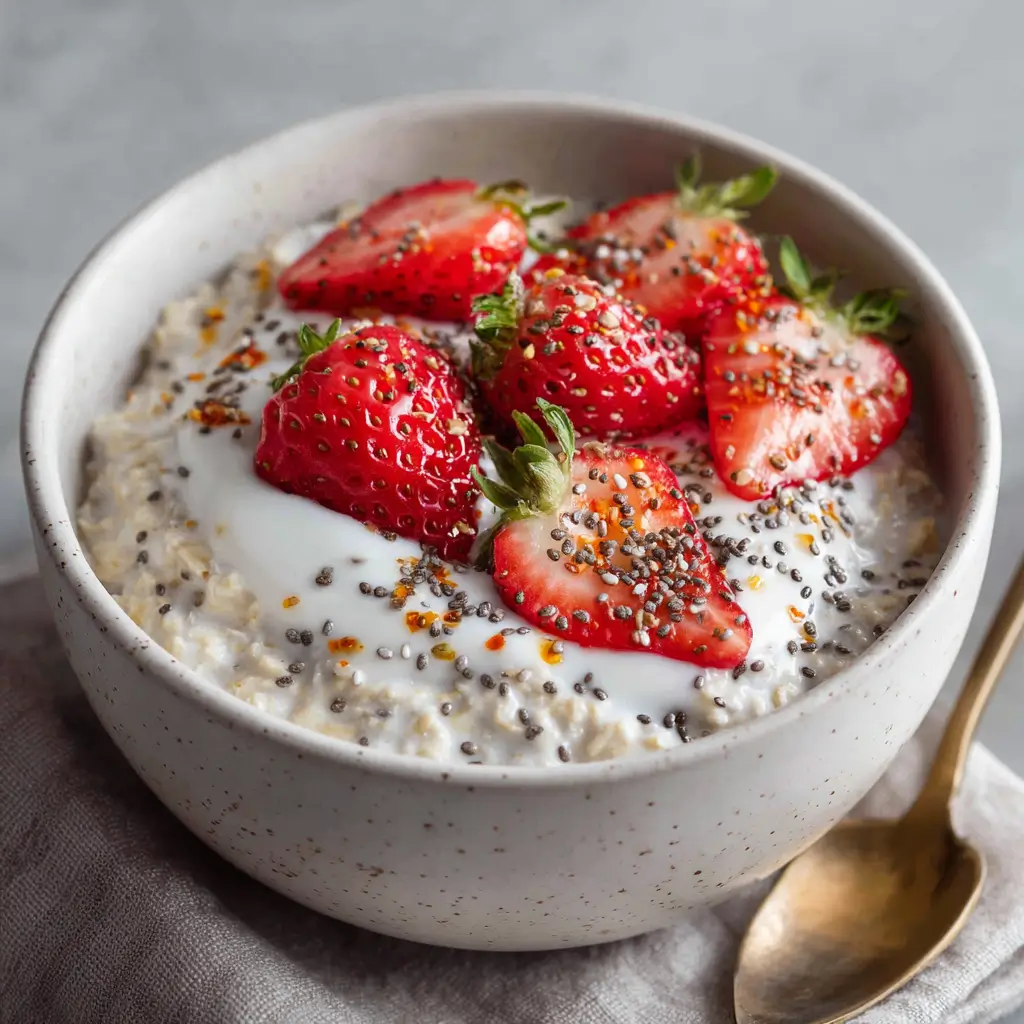
Why overnight oats rank high for slimming
In the debate of overnight oats vs other breakfasts, oats rank higher because they can be tailored to fit weight-loss goals without sacrificing taste. Their high fiber content makes them filling, while add-ins allow you to control calories and nutrients. Unlike many breakfasts that spike hunger soon after, overnight oats provide steady energy and satiety, which are essential for sustainable weight loss. They also reduce the temptation to snack between meals.
Explore More :
If you want similat resipces lcheck out overnight oats for weight loss.
Tips to Make Overnight Oats Healthier
Choosing the right toppings
In the discussion of overnight oats vs other breakfasts, toppings can make or break your weight-loss progress. Adding too much sugar, honey, or flavored yogurt can turn a healthy bowl into a calorie bomb. Instead, focus on nutrient-dense toppings like berries, chia seeds, or a small spoon of nut butter. These add fiber, protein, and healthy fats without overwhelming your calorie budget. The right toppings not only improve taste but also increase satiety, making overnight oats a smarter choice than cereal or toast for anyone aiming to slim down.
Portion control and calorie awareness
Another essential step in comparing overnight oats vs other breakfasts is portion size. Even healthy meals can cause weight gain if portions are too large. A well-balanced serving of overnight oats should include about half a cup of oats, one cup of milk or yogurt, and moderate toppings. This keeps calories in check while delivering plenty of fiber and nutrients. Portion control is what makes oats stand out compared to smoothies or toast, which are easier to overeat without realizing it.
For creative topping ideas and presentation inspiration, explore our Pinterest boards full of overnight oats variations.
FAQs About Overnight Oats and Weight Loss
Are overnight oats a good breakfast for weight loss?
Yes — overnight oats are one of the best options when comparing overnight oats vs other breakfasts. They are high in fiber, customizable, and easy to portion for calorie control. Unlike cereal or toast, which often leave you hungry, overnight oats digest slowly and keep you full for hours.
What’s the best breakfast to lose weight?
The best breakfast for slimming combines protein, fiber, and healthy fats. Overnight oats naturally fit this formula, especially when paired with Greek yogurt, chia seeds, or nuts. While smoothies and toast can be healthy, they don’t always provide the same satiety.
Are overnight oats better for you than regular oats?
Nutritionally, overnight oats and cooked oats are similar, but soaking preserves more resistant starch, which supports digestion and fullness. This makes them slightly more effective for weight management.
Which is better for weight loss, overnight oats or cooked oats?
Both are excellent choices, but overnight oats may have the edge because they are easier to prep, portion-controlled, and retain more resistant starch. This makes them particularly effective in the overnight oats vs other breakfasts comparison. For recipe inspiration, explore our Peanut Butter Overnight Oats, which delivers protein, fiber, and healthy fats in one satisfying bowl.
Conclusion
Key takeaways: overnight oats vs other breakfasts
The debate of overnight oats vs other breakfasts shows a clear winner for weight loss. Compared to cereal, overnight oats provide more fiber and fewer hidden sugars. Against smoothies, oats are lower in calories and deliver longer satiety. When compared to toast, oats release energy more steadily and keep cravings away. Even against cooked oats, overnight oats often rank higher because soaking preserves resistant starch, improving fullness. In short, overnight oats vs other breakfasts consistently proves that oats are a smarter choice for slimming and long-term health.
Final thoughts on slimming with smart breakfast choices
Weight loss isn’t about skipping meals — it’s about choosing foods that keep you full, satisfied, and energized. Overnight oats are easy to prepare, customizable, and naturally rich in nutrients that support fat loss. In the bigger picture of overnight oats vs other breakfasts, oats deliver balance, taste, and convenience, all in one bowl. To get more healthy breakfast inspiration and slimming recipes, explore our Quick Overnight Oats Recipes. And for daily tips, ideas, and community support, don’t miss following us on Facebook.
